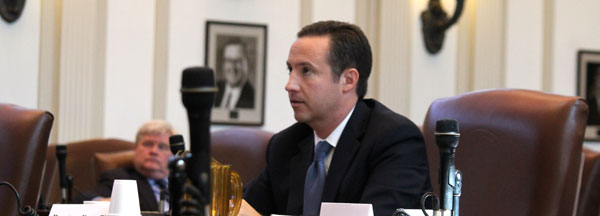
Caption
Joe Wertz / NPR StateImpact


Caption
Joe Wertz / NPR StateImpact

Joe Wertz / NPR StateImpact
Task force member Preston Doerflinger, who serves as both Secretary of Finance and Revenue and the director of the Office of State Finance, questioned a proposal to create a tax credit oversight board.
The tax credit task force on Wednesday approved a list of strict controls on economic incentives.
The 10-member panel is still hashing out the specific wording of a final report due later this month, but the members present at the meeting voted unanimously to approve several specific recommendations.
The approved recommendations stem from state Rep. David Dank’s nine-part plan, which the Republican task force co-chair laid out on Nov. 9. The recommendations will affect how credits and incentives are issued and monitored, and which credits might ultimately be eliminated.
Task force members Rep. Scott Inman, D-Del City, and State Treasurer Ken Miller didn’t attend Wednesday’s meeting, representatives for both men confirmed.
While most of the broad concepts were approved at Wednesday’s meeting, the Task Force for the Study of State Tax Credits and Economic Incentives is still working out a few key details.
The panel took no action on Dank’s proposal to form a Board of Equalization-styled panel of state officials and elected lawmakers that would review credits and incentives before they’re issued.
The Oklahoman’s Michael McNutt on the “quibbling” that ensued:
It seemed some Republicans on the panel, who have talked about the need to downsize state government and to reduce the number of existing boards and commissioners, were hesitant about forming a new board
The task force’s final report will be given to the state Legislature for consideration in bill-making. House Speaker Kris Steele told Oklahoma Watch that the task force’s recommendations will receive “priority consideration” when the legislative session starts in February.